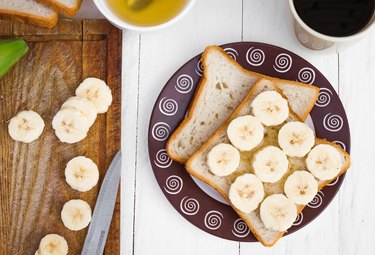
Folic acid, also known as folate, is a B-complex vitamin — vitamin B9 to be precise. It's well-known for its role in preventing birth defects, preterm deliveries and many other health issues. However, a less-known fact is that folic acid may help boost fertility. The National Institute of Health recommends about 400 micrograms of dietary folate per day for most adults. If you're trying to get pregnant, you may require twice this amount, or even more.
Folic Acid (Vitamin B9)
Video of the Day
Folate's function is to help prevent a wide range of health issues, such as anemia, diarrhea and ulcers as well as conditions like cancer, heart disease and neurological and neuropsychological disorders. Because it helps prevent birth defects and preterm deliveries, folic acid is particularly well-known for its importance in the development of infants. It works in conjunction with other essential vitamins and minerals to help people stay healthy.
Video of the Day
Read more: Is Folic Acid Good for Men?
Folic Acid and Fertility
The link between folic acid and fertility has come under question in many studies. Recently, it's been said that folic acid is able to help boost fertility. However, this occurs only at particularly high doses and is not guaranteed to help women. Women with higher than average levels of folic acid don't necessarily have improved fertility.
Interestingly, studies that feature higher levels of fertility tend to have extremely high doses of this vitamin. Supplementation of anything from 2 to 12.5 times the typical recommended daily amount have been used. Folic acid at such high doses also seems to boost the sperm count of men, promoting their fertility. If you're having trouble conceiving, you should talk to your doctor before starting folic acid supplements in order to figure out the right amount to take. Too much folic acid can cause unpleasant side effects.
Folic Acid in Your Diet
Folic acid is considered to be an essential vitamin for both men and women. It's available in the form of supplements, or naturally through foods. Foods with naturally-occurring folate include fruits and vegetables. According to the United States Department of Agriculture, you can find folate in fruits like avocado, banana, citrus fruits and papaya. You can also find this vitamin in vegetables like asparagus, broccoli, brussels sprouts and many leafy greens. The U.S. Food and Drug Administration has also been adding folic acid to cereal and grain products since 1998. This means that rice, pasta, bread products and breakfast cereals are all usually good sources of folic acid.
Like all vitamins, folic acid is also available as a supplement. In fact, this is the difference between folate and folic acid. Folate is the naturally occurring version of vitamin B9, while folic acid is the vitamin in supplement form. Folic acid in supplement form is about 50 to 60 percent as beneficial as naturally-occurring folate. In actual numbers, this means that every microgram of folate you eat is equivalent to 0.5 or 0.6 micrograms of folic acid supplement.
Most adults should consume about 400 micrograms of folate a day in food, but this value will increase if most of your folic acid is coming from supplements. If you're trying to get pregnant, are pregnant or are lactating, the total amount of folate you should consume will be higher (at least 500 to 600 micrograms per day). When you have the choice, it's better to consume foods rich in folate than folic acid supplements.
- Fertility and Sterility: Effects of Folic Acid and Zinc Sulfate on Male Factor Subfertility: A Double-blind, Randomized, Placebo-controlled Trial
- International Journal of Fertility & Sterility: Folic Acid and Female Fertility in Natural and Assisted Reproduction
- Food and Nutrition Research: Compliance to the Recommended Use of Folic Acid Supplements for Women in Sweden is Higher Among Those Under Treatment for Infertility than Among Fertile Controls and Is Also Related to Socioeconomic Status and Lifestyle
- Reproductive Biomedicine Online: Folic Acid Supplementation and IVF Pregnancy Outcome in Women With Unexplained Infertility
- American Journal of Obstetrics and Gynecology: Diet and Fertility: A Review
- NIH: Folate
- USDA: Food Composition Database: Folic Acid
- Medline Plus: Folic Acid in Diet
- Neuroscience and Psychiatry: Neuroprotective Effects of Prenatal Folic Acid Supplementation
- Preventive Medicine: Folic Acid Supplementation During the Preconception Period